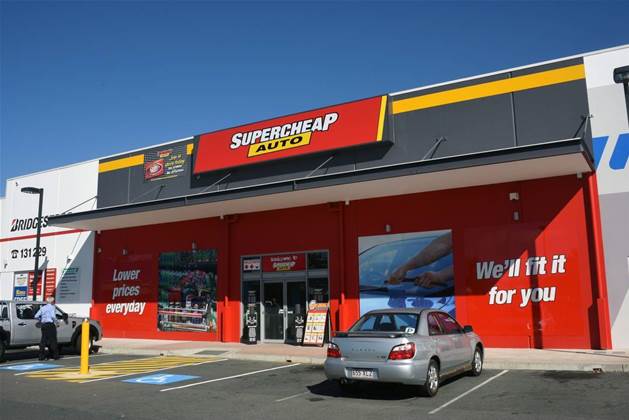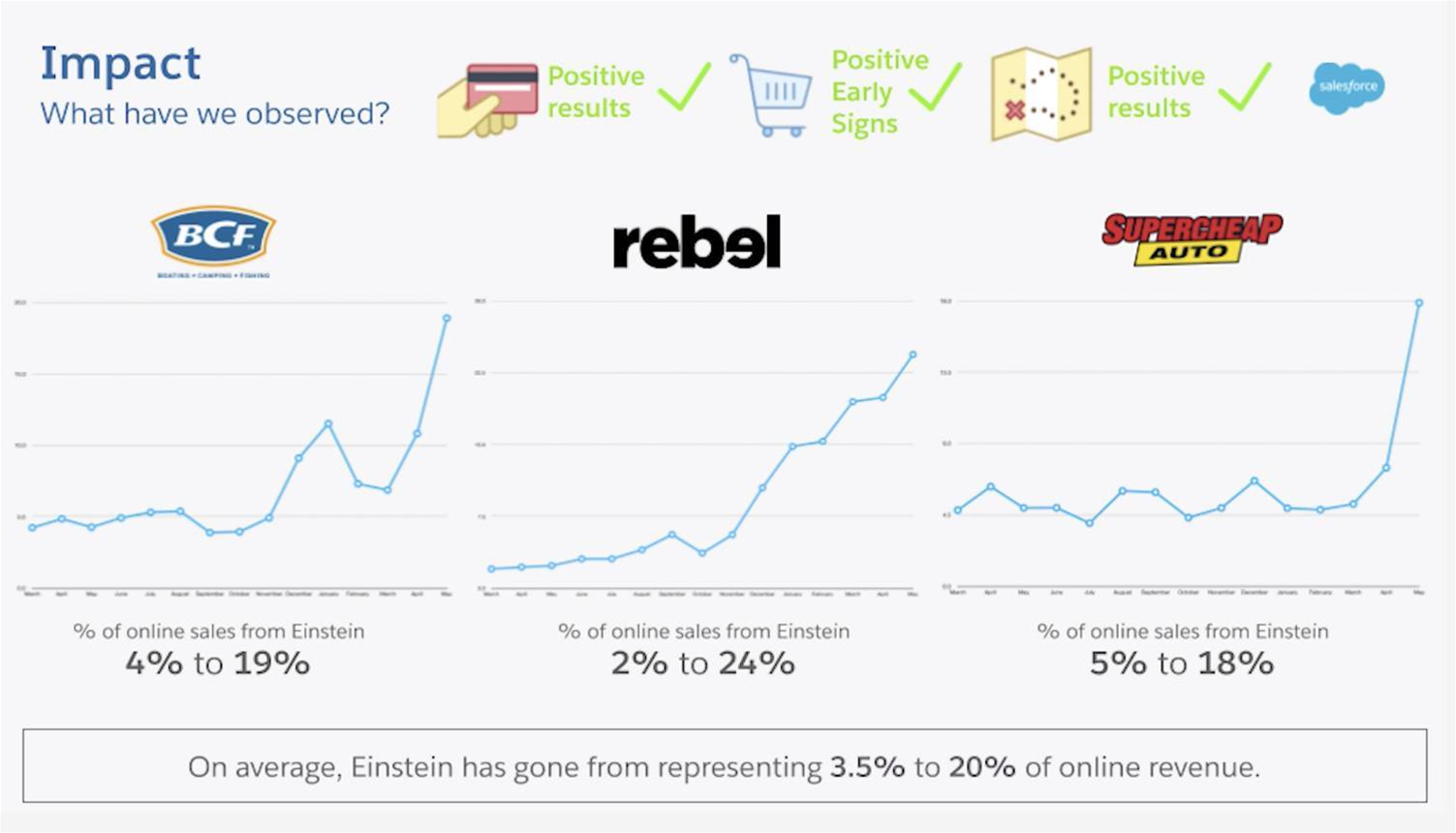Super Retail Group is now generating a fifth of its online revenues from its use of product recommenders, an almost six-fold rise in the space of a year.

Omni retail general manager Brian Townshend told the recent Salesforce Live for retail and consumer goods summit the group’s use of Salesforce’s Einstein Product Recommendations had led to “phenomenal” online growth.
“To give you a sense of scale and how we've grown with Einstein, last year it was contributing about 3.5 percent of our online revenue - this year we're at 20 percent,” Townshend said.
“The growth has just been phenomenal and great credit to the platform specialists within the Group Omni (GO) team for making that happen.
“We look at the customer journey, we work out different stages where the opportunity is to put recommendations in front of them, and we test like mad.
“Is it the right place [to make recommendations]? What are the rules? How can we configure it, do A-B [testing] and consistently look for new ways to optimise the Einstein recommendations for our customers?”
The recommendations engine played a part in Super Retail Group’s (SRG) online growth during COVID, though it owed much of its ability to cope to its broader omnichannel transformation, which has been underway since at least 2018.
Townshend said that due to COVID, online’s revenue contribution to SRG had grown from 8 percent to “over 18 percent”.
Recommenders, recommenders everywhere
SRG - which is home to retailers like Super Cheap Auto, BCF, macpac and Rebel Sports - identified three areas of opportunity for the application of Einstein, which is the umbrella brand for Salesforce’s artificial intelligence capabilities.
The group’s online properties already run on Salesforce commerce cloud, so Einstein performs as an add-on to the sites.
“The first opportunity is conversion through personalised and relevant product experiences, the next one is increasing average transaction value and the basket size, and the last one is increasing the associated product range discovery,” senior manager of omni UX, insights and conversion Ari Freedman told a separate session at the same summit.
On personalised experiences, Freedman said that when customers hit a website, the retailers tried to surface products relevant to them.
“It's that top-of-funnel relevance,” he said.
“We're also playing in this space, using our search insights to see if there's any other ways we can optimise it. But for example, during COVID we saw a massive uplift in search data showing home fitness being a really prominent search topic so we've actually put something on the homepage [that is] Einstein-driven, and with a lens on home fitness for the customer. We're seeing some fantastic results there.”
In addition to the home page, Einstein is also active on product and search listing pages. Here, the retailer is able to push particular brand affiliations or products it has a lot of stock of while “demoting clearance products” from being displayed first.
“We've also got Einstein recommenders on those pages as well, whether that's bestsellers from those categories, or perhaps something recommended for you based on your previous browsing experience as well,” Freedman said.
“What we're finding is that even with multiple recommenders on one page, we're still seeing some phenomenal results come through.”
Einstein is also active on store locator pages. Freedman acknowledges this is a slightly out-of-the-ordinary use case for a recommender engine, but said it had generated results.
“With such a large bricks-and-mortar network that we have among our stores at Super Retail Group, the store locator page is a high entry point for our customers to our website,” he said.
“[We’re trying to] make sure that no matter where the customer comes from, or no matter where they enter our website, we're serving up a relevant product experience as soon as they hit us.”
To increase average transaction value and basket size, SRG surfaces recommendations once a customer adds a product to their cart, and again at the online checkout.
For example, a BBQ purchase might come recommended with a cover, tongs, cleaning set or other accessories.
“Anything under $30 is actually working really well for us and the customer's clearly seeing that as a bit of that impulse buy opportunity,” Freedman said.
Again, Freedman acknowledged that posting recommendations during the checkout was unusual but backed up by SRG’s testing as worthwhile.
“It's just that last minute opportunity for the customer to grab any of those additional items to make the most of their current purchase,” he said.
“Some of you might be sitting there thinking that's a bit weird. Why would you put product recommenders in the cart? That's a distraction.
“We had the same thought and so we've also tested the existence of these recommenders as well, not just [their] position on the page and the logic behind them, but when they're there versus when they're not there, and again, we’re seeing positive results … so they remain there today.”
On the third opportunity - associated product range discovery - Freedman noted the company’s retailers carried a lot of brands, and there is a lot of width in product categories and ranges.
“It's important that we make sure that the customer understands and is aware of those ranges and [that we’re] using Einstein to drive them deeper into the exploration of those product ranges,” he said.
This could materialise if a customer scanned through an entire product page from top to bottom, taking in the descriptions, photos and reviews, but did not add anything to their cart.
“We really don't want them to think that they've come to a deadend,” Freedman said.
“Maybe this particular product isn't for them, but they want something similar so we can show them similar products.
“Showing them what other customers are also purchasing with this product is also a point of inspiration for our customers. The customer might be looking for what other uses there are for the product.”
Seeding AI
Freedman said his team had to lay some groundwork before introducing Einstein to the extent it now runs.
“We had to let [the business] know what Einstein could and couldn’t do, and how long it needed before it could actually start to serve up some really relevant results for our customers,” Freedman said.
Part of the effort continued with continuous testing of the engines, such as where they were placed on a page, and the impact of having an engine on the page versus not having one.
“It's natural that you will have some cynics and some skeptics within the business, so put Einstein to the test - don't be afraid to throw down the gauntlet with your merchandisers,” Freedman advised.
He said the GO team also shared the performance of Einstein regularly to “show how Einstein is learning over time, show how the results are becoming more relevant over time” and to be transparent about “the wins and the failures.”
Freedman said SRG would continue to expand its use of Einstein.
“We've been experimenting with putting Einstein in our account pages, so showing member offers when you go to login,” he said.
“We’re also enhancing the product recommender UI so we've recently just rolled out a change which allows us to show either four, five or six products to the customer in any one recommender [window], so obviously reducing clicks and allowing [customers] to explore more of a product range with less effort.”
The company is also hoping to make it easier to click a product from a recommender and add it to the cart instantly.
“At the moment, for those impulse buys, you have to go into the product [page] and then add it to the cart,” he said.
“We'd love to give the customer a really quick way to just add it to the cart if it's something that they don't really need to consider the purchase too much. For example, a pair of BBQ tongs.”
A more specific integration being explored is the use of Einstein in ‘My Garage’, which is a function of the Super Cheap Auto website where customers “put in their vehicle registration and we actually return results relevant to their car so they can shop with confidence and understand if something does or doesn't fit their specific vehicle they drive.”
“Obviously integrating Einstein with vehicle specific recommendations is a massive opportunity for us at Super Retail Group,” Freedman said.



_(22).jpg&h=140&w=231&c=1&s=0)
_(28).jpg&h=140&w=231&c=1&s=0)
.png&h=140&w=231&c=1&s=0)
_(20).jpg&h=140&w=231&c=1&s=0)



_(26).jpg&w=100&c=1&s=0)

 iTnews Executive Retreat - Security Leaders Edition
iTnews Executive Retreat - Security Leaders Edition












_(1).jpg&h=140&w=231&c=1&s=0)



